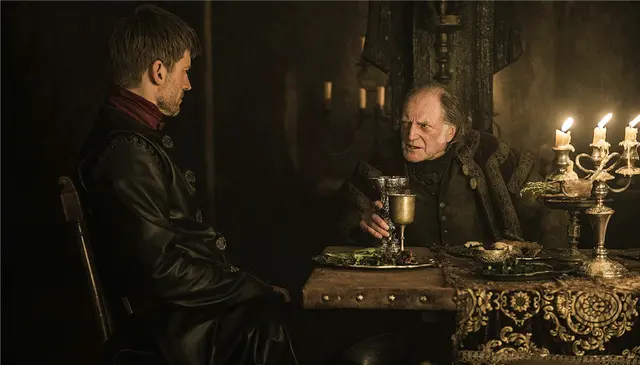Spoiler alert:Do not read unless you have watched season six, episode 10, which airs in the UK on Sky Atlantic on Monday at 9pm, and is repeated in Australia on Showcase on Monday at 7.30pm AEST.
A couple of episodes back, when the Hound was negotiating over the right to avenge the death of Septon Ray, he was brought up short as he attempted to swing his axe. “No no no no no,” Thoros of Myr muttered. “We’re not butchers. We hang them.”
“Hanging?,” the Hound spat back. “All over in an instant. Where’s the punishment in that?”
“They die,” said Thoros, and the Hound was almost amused by his naivety. “We all bloody die,” he replied.
As the bodies piled up in the last episode of this series ofGame of Thrones, we were reminded that Thoros and the Hound’s debate is always going to be salient in Westeros. We do, indeed, all bloody die; the best that can be hoped is not to die bloodily. A quick and painless end, or one that comes in a manner of your choosing, is so hard to guarantee that you can often see the relief in the eyes of those who manage it even as they pass away. Torture and delay, on the other hand, are the show’s lifeblood: the exquisite agony of the wait, and the Freudian satisfaction when the inevitable finally comes.
One way of diagramming this episode, called The Winds of Winter, is as an exercise in the practical advantages of speed on the one hand, and the vengeful pleasures of taking it slow on the other. Either way, death is usually horribly thrilling, particularly in an episode where its application is so shot through with comeuppance: whereas last week’s battle was bracingly indiscriminate, the death meted out here was always with specific political or personal ends.
Cersei torched the Sept, and the speed and ruthlessness of her move was like a slap in the face; Margaery,the High Sparrow, Loras and a crowd of hapless hangers-on incinerated in an instant, and the queen mother’s supremacy suddenly restored. Tommen’s suicide was beautifully constructed and heartbreakingly matter-of-fact, a good-hearted boy’s inescapable response to the proof that he is not cut out for this world: he didn’t so much leap to his death as give up trying to stand.
Everyone else had to suffer. Grand Maester Pycelle got set upon by Qyburn’s deeply sinister flock of little birds. Lancel had to crawl towards the wildfire, knowing in the last instant that he had failed to serve his faith and that the consequential defeat would be absolute. Septa Unella, the nun who tormented Cersei, seemed almost exultant that it was all over, just as Ramsay Snow embraced his death wish last week. But then Cersei told her: “You’re not going to die today.” And, just like Ramsay Snow, Unella had her certainty that she could retain some semblance of control, and hence dignity, ruthlessly pulled away by the woman she had once tormented.
Then there was the emergence of Arya as a significant player once more, echoing Cersei’s taunt that she would be the last thing her victim saw before she died, and ensuring that Walder Frey had a large mouthful of son pie before she slit his throat. Like its source, Titus Andronicus, the scene was so grotesque as to tilt into absurdity (I found myself picturing Arya baking in a chef’s hat, and her frustration that the crust hadn’t come out exactly as she’d hoped) and, therefore, to mock us for our relish at such depravity. But don’t pretend you didn’t find it satisfying all the same.
As GoT chugs on, I find myself, increasingly, manifesting symptoms of Stockholm syndrome: a delight at this agonised suspension, a reluctance to give it up, and a pathetic sort of gratitude for any moment of relief. (Thank you, showrunners, for letting us see Sam in his library.) Now, finally, the intricate machinations that have ground on for so long seem to finally be coming to a head: winter coming, alliances solidifying, thrones and revenge taken alike.
Whether quick or slow, the profusion of violence in The Winds of Winter offers a lesson fairly consistent with GoT’s wider calculus: above all, you must be decisive. And as Daenerys and Jon finally saw their plans click into place, that variable seemed like a decent guide to their chances of success. Daenerys knows what she has to do; she ditches Daario to do it. A series ended again with a shot of her in the ascendant, and the question of whether she will prove to be good or evil seems much more precarious than the question of whether she will succeed.
Jon, on the other hand, is still some way from bearing the hallmarks of a true king. Despite the fate of his lineage and the clarity of his vision – he is perhaps the only key player who viscerally understands where the real war lies, and what its consequences will be – he is undermined by his occasional, entirely relatable inability to do the necessary, unforgivable thing. All right, he’s hanged a teenager. But his fudge on Melisandre – neither punished to appease Ser Davos nor kept at his side for the conflict ahead – doesn’t bode well for his chances of keeping Littlefinger at bay. If he is to become the ruler that his people need, he will have to toughen up.
As it stands, he is the image of the merciful peacetime leader. But winter isn’t coming any more: it’s already here.
 简体中文
简体中文

